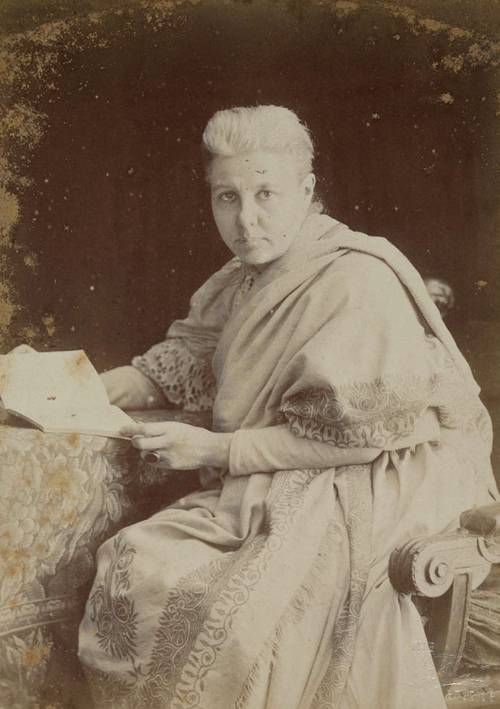
FAQ About Annie Besant

Who was Annie Besant?
Annie Besant was a prominent British social reformer, women's rights activist, writer, and theosophist born in 1847. She played a significant role in social and political movements in both England and India, championing causes such as labor rights, secular education, and Indian self-rule. Besant's influence extended through her leadership within the Theosophical Society and her involvement in the struggle for India's independence.

What were Annie Besant's contributions to women's rights?
Annie Besant was a passionate advocate for women's rights, focusing primarily on education and autonomy. She campaigned for women's access to birth control information and was deeply involved in movements that sought equal opportunities for women in education and employment. Her activism also included publishing works that highlighted social issues affecting women, thereby raising public awareness and driving legislative reform.

What is Annie Besant known for in theosophy?
Annie Besant became a notable figure in theosophy after joining the Theosophical Society in 1889. She eventually served as the president of the society, during which she expanded its influence globally. Besant's work in theosophy encompassed lecturing, writing extensively on spiritual matters, and helping to introduce and interpret Eastern religious philosophies to Western audiences.

How did Annie Besant influence India's independence movement?
Annie Besant significantly influenced India's independence movement by advocating for self-rule and organizing political action. In 1916, she formed the Home Rule League to demand greater autonomy for India and became one of the first female presidents of the Indian National Congress. Her engagement with Indian leaders and her fervent speeches inspired many in the country’s fight for independence.

What was Annie Besant's role in education reform?
Annie Besant was deeply committed to education reform. She promoted secular and scientific education, supporting various educational institutions and initiatives designed to provide access to quality education for all societal layers, including the marginalized. Besant's efforts included the establishment of schools and colleges in India, aimed at fostering a more educated and empowered populace.

What books did Annie Besant write?
Annie Besant authored numerous books and articles covering topics such as theosophy, social reform, and politics. Notable works include 'The Ancient Wisdom', 'The Path of Discipleship', and 'An Autobiography'. She wrote extensively on subjects related to spiritualism, the rights of women, and educational reforms.

How did Annie Besant become involved in theosophy?
Annie Besant became involved in theosophy following a period of personal spiritual exploration. Initially interested in secular and atheistic views, she was drawn to theosophy after reading the works of Madame Blavatsky, one of the movement's founders. This led her to devote her life to studying and promoting the principles of theosophy.

What impact did Annie Besant have on Indian society?
Annie Besant had a profound impact on Indian society through her advocacy for self-rule, education reform, and social justice. She was instrumental in promoting Indian nationalism, and her efforts in education led to the establishment of several institutions that continue to serve Indian society today. Her engagement with spiritual and cultural practices also helped bridge Western and Eastern philosophies.

Was Annie Besant ever imprisoned for her activism?
Yes, Annie Besant was briefly imprisoned in India due to her political activism. Her involvement in the Home Rule Movement, which demanded self-governance for India, led to her arrest in 1917 by the British authorities. However, the incident only magnified her stature and influence in the Indian independence movement.

How did Annie Besant's views on religion evolve over time?
Annie Besant's views on religion evolved notably over her lifetime. Initially brought up in a Christian household, she moved towards secularism and atheism in her early adulthood. However, her spiritual journey eventually led her to embrace theosophy, where she focused on understanding and reconciling various religious philosophies, emphasizing a universal spiritual message.

What was Annie Besant's involvement with the Indian National Congress?
In 1917, Annie Besant became the first female president of the Indian National Congress, a pivotal moment in her political engagement within India. Her leadership in the congress reflected her strong advocacy for India's self-rule, and she was a significant figure in drafting policies and fostering unity among Indian political leaders.

How did Annie Besant influence modern spiritual thought?
Annie Besant influenced modern spiritual thought by integrating Eastern philosophies such as Hinduism and Buddhism into the Western spiritual discourse through theosophy. Her writings and teachings emphasized a holistic spiritual approach that sought to bridge the gap between science and spirituality, advocating for a deeper understanding of life beyond religious dogmas.

What challenges did Annie Besant face in her activism?
Annie Besant faced numerous challenges in her activism, including public criticism and legal battles, particularly regarding her controversial stances on birth control and women's suffrage. In India, her advocacy for self-rule led to opposition from colonial authorities and conservatives. Despite these obstacles, her persistent efforts left a lasting impact on both British and Indian societies.

Why did Annie Besant become a leader in the Theosophical Society?
Annie Besant's deep commitment and intellectual grasp of theosophical teachings made her a natural leader within the Theosophical Society. Her ability to articulate the society's principles and inspire followers through lectures and writings established her as a prominent figure, leading to her election as its president in 1907.

In what ways did Annie Besant collaborate with Indian leaders?
Annie Besant collaborated with Indian leaders by joining forces with activists such as Bal Gangadhar Tilak and Pandit Madan Mohan Malaviya in the Home Rule Movement. Her strategic alliances and shared vision for India's freedom amplified the movement's reach and effectiveness, fostering greater support for Indian self-governance.

What is Annie Besant's legacy in social reform?
Annie Besant's legacy in social reform is marked by her tireless advocacy for equality, education, and political freedom. Her influence can be seen in the progression of women's rights, labor laws, and the educational reforms she supported. Her work laid the foundation for future reformers and highlighted the interconnected nature of social issues and governance.

Did Annie Besant have any involvement in science?
While Annie Besant was not a scientist, she had a keen interest in scientific developments, particularly in areas that intersected with spiritual thought. Her advocacy for secular and scientific education highlighted her belief in the importance of critical thinking and scientific inquiry as vital components of education and personal development.

What was the Home Rule League, and how was Annie Besant involved?
The Home Rule League was an organization founded by Annie Besant in 1916 to campaign for self-government in India. She modeled it after the Irish Home Rule Movement and used it as a platform to promote political education and awareness among Indian citizens, aiming to unify various social groups in the quest for autonomy.

How did Annie Besant contribute to labor rights?
Annie Besant championed labor rights through her activism and writing, advocating for better working conditions and pay for workers, particularly in the late 19th and early 20th centuries. Her support for labor unions and her campaigns against child labor and exploitation were part of her broader commitment to social justice and equality.

How has Annie Besant's work influenced contemporary movements?
Annie Besant's work has continued to influence contemporary movements, particularly those focused on women's rights, educational reform, and spiritual diversity. Her integration of social ethics with spiritual perspectives has encouraged modern movements to adopt holistic approaches in addressing societal challenges.
